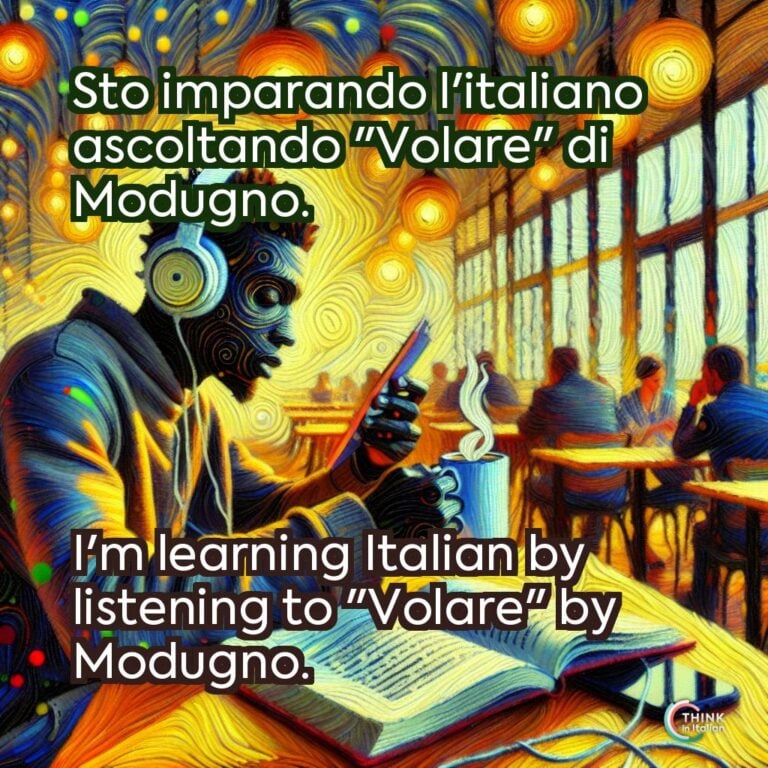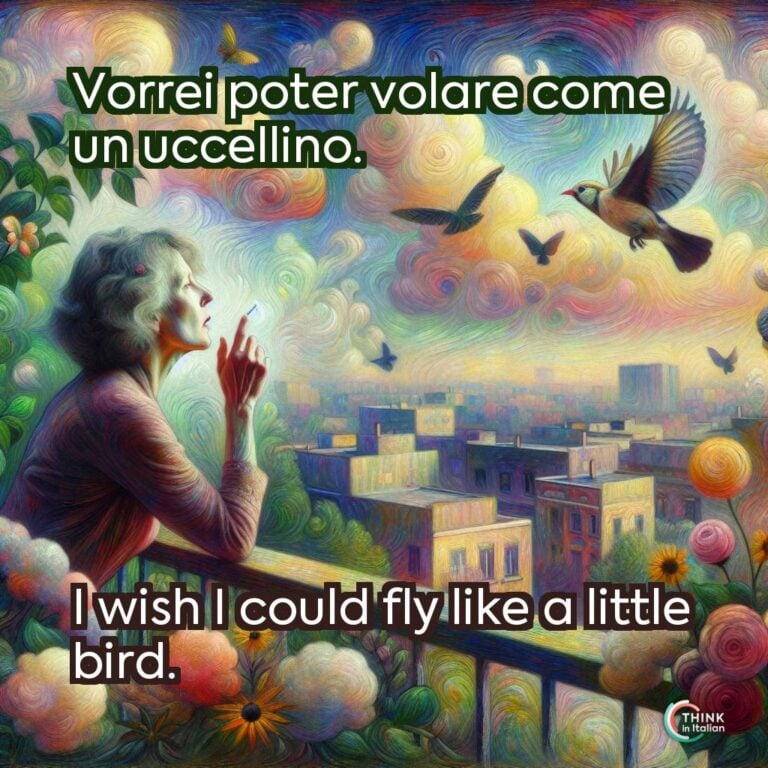“Volare” in Italian
“Volare”: Meaning
No matter where in the world you are, chances are you’ve heard Domenico Modugno’s iconic song Volare at least once. The song’s original title is “Nel blu dipinto di blu“, and is one of those easy Italian songs that every learner listens to practice.
But what does volare mean in Italian? Here, I will guide you through different facets of this verb: its meaning, its grammar, and its uses.
At its core, volare means “to fly” and is a regular verb which belongs to the category of the -are verbs, that is, the first conjugation in Italian. Below, I will show you how volare is conjugated in the main verb tenses of the indicative mood.
“Volare”: Conjugation
| Subject Pronoun | Conjugation |
|---|---|
| Io | volo |
| Tu | voli |
| Lui/Lei | vola |
| Noi | voliamo |
| Voi | volate |
| Loro | volano |
| Subject Pronoun | Conjugation |
|---|---|
| Io | ho volato |
| Tu | hai volato |
| Lui/Lei | ha volato |
| Noi | abbiamo volato |
| Voi | avete volato |
| Loro | hanno volato |
| Subject Pronoun | Conjugation |
|---|---|
| Io | volavo |
| Tu | volavi |
| Lui/Lei | volava |
| Noi | volavamo |
| Voi | volavate |
| Loro | volavano |
| Subject Pronoun | Conjugation |
|---|---|
| Io | volerò |
| Tu | volerai |
| Lui/Lei | volerà |
| Noi | voleremo |
| Voi | volerete |
| Loro | voleranno |
For example:
Vorrei poter volare come un uccellino.
I wish I could fly like a little bird.)
È volata a Berlino la settimana scorsa.
She flew to Berlin last week.
“Volare”: Grammar
Linguistically speaking, it is a complex verb. I will give you a simple overview just to show you its syntactical nature, which might affect your understanding of the auxiliary choice – essere vs avere – for transitive and intransitive verbs.
Verbs like volare can be used in two different ways that change their meaning. When volare is used as an inergative verb, it conveys an ongoing action that is not focused on reaching an end point. When used in this way, we use the auxiliary avere (to have) in compound tenses, for example:
Ha volato tutta la mattina.
He has been flying all morning.
Here, the action of flying continues without a clear destination. If you are interested in linguistic details, be aware that this is called atelic because it doesn’t have an end goal.
In its inergative use, it resembles transitive verbs with the only exception that it is not linked to any direct object, as it does not select any.
However, it shares the aspect of not selecting prepositions either, unless you want to indicate general locations or time spans. Look at the two sentences below, with the inergative verb volare and the transitive verb mangiare (to eat):
Ha volato per la città tutta la notte.
He flew around the city all night.
Ha mangiato per la città tutta la notte.
He ate around the city all night.
In both cases, there is no direct object, yet we used the preposition per to express where the action of flying or eating occurred.
When volare is used as an unaccusative verb, it means the action has a clear result or endpoint. When used this way, we use the auxiliary essere (to be) in compound tenses, for example:
Lui è volato a Parigi.
He flew to Paris.
Here, it shows that the action of flying ends with arriving in Paris. This is called telic because it has an end goal, and is treated as a movement verb.
In its unaccusative use, prepositions are used to indicate the destination or final point of the action. In this sense, it resembles intransitive verbs in all and all.
È volato a Roma.
He flew to Rome.
È volato verso l’orizzonte.
He flew toward the horizon.
The Metaphorical use of “Volare”
The verb volare is more than just a way to describe physical flight. In Italian, it is commonly used in idioms and expressions that convey metaphorical meanings to evoke dreams, ambition, and the fleeting nature of time.
- Volare basso (to fly low): used metaphorically to mean staying humble or not taking risks.
Vola basso e non aspettarti troppo.
Keep your expectations low and don’t expect too much.
- Volare alto (to fly high): used to express setting high goals or ambitions.
Nella sua carriera ha sempre volato alto.
In his career, he has always aimed high.
- Volare con la fantasia (to let one’s imagination run wild)
Quando scrive, vola con la fantasia.
When he writes, he lets his imagination run wild.
- Il tempo vola (time flies): used to express how quickly time passes.
Quando ci si diverte, il tempo vola.
When you’re having fun, time flies.
- Volare via (to fly away): used to describe time or objects disappearing quickly.
Le ore sono volate via durante la festa.
The hours flew by during the party.
Fly Away With Singing
I want to wrap up this article with a sentence I love about the song “Nel blu dipinto di blu“, co-written by Franco Migliacci and Domenico Modugno and released in 1958.
The lyrics tell the story of a dream where the singer paints himself blue and soars into the sky. The protagonist revels in the boundless sky, flying higher than the sun and experiencing a world that fades away in the face of his joy.
This song really is an emotional journey, one that resonates with feelings of love, freedom, and the euphoria of being untethered.
E volavo, volavo felice più in alto del sole ed ancora più su, mentre il mondo pian piano spariva lontano laggiù.






